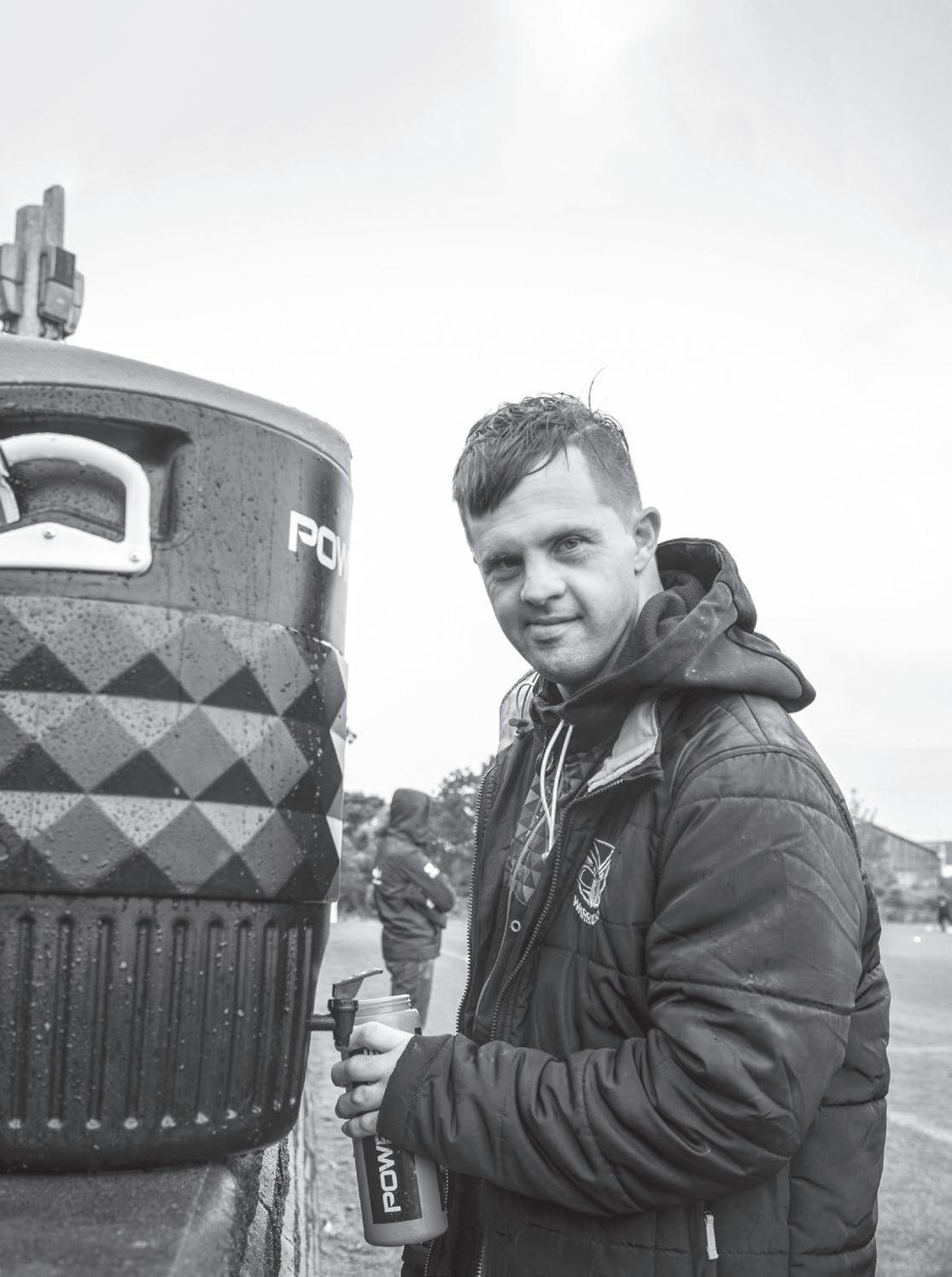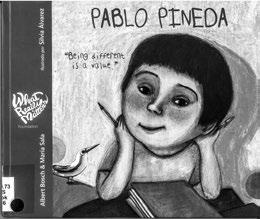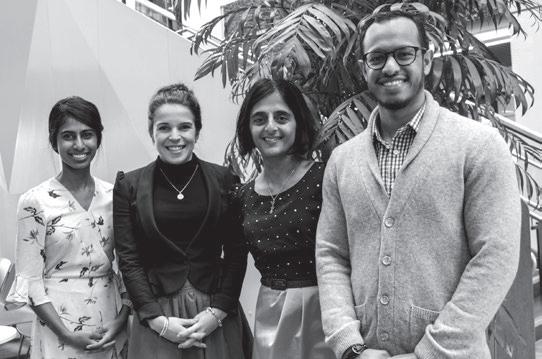
6 minute read
Down syndrome community gets involved in Education Summit
S eve ra l m e m b e r s o f the New Zealand Down Syndrome Association have taken part in Education Summit events that will help to determine the future education in New Zealand. The Summit events were part of Kōrero Mātauranga, a national conversation about education, which was launched by the Prime Minister, the Rt Hon Jacinda Ardern, on March 23. The goal was to bring t o g e t h e r t h e w i d e r c o m m u n i t y a n d t h e education sector to achieve shared ownership of a vision for the education system for the future. This process will set the direction of travel and agree shared priorities across the whole system – from early learning, schooling and tertiary through to lifelong learning. The NZDSA was invited to nominate three people to attend the Christchurch Summit and three people to attend the Auckland Summit. “There were over 3000 expressions of interest and many people were disappointed that they couldn’t attend,” says Zandra Vaccarino who attended the Auckland Summit on May 12-13. Zandra says that having NZDSA representatives attend the Education Summit ensured that discussions included greater diversity and that their contributions would enrich the 30-year vision for Education. “It was also an opportunity f o r t h e N Z D S A representatives to ensure that the aspirations and goals of learners with Down syndrome and their family and whānau were recorded in the discussions.” “I think having Andrew Oswin and Abigail Knight re p re s e n t t h e vo i c e of people with Down syndrome was extremely valuable and powerful and it was the first time we have had self-advocates attend and contribute to National Education meetings.” Angelique van der Velden attended the Christchurch Summit as a parent, a teacher, as a member of the Canterbury Down Syndrome Committee and the NZDSA Education Committee and said that the event felt like we were part of making history. “We truly had conversations about where we want education to go and that what we suggested will become the framework for change,” said Angelique. The Christchurch event at the Horncastle Arena on May 5, attracted 800 people from all walks of life including educators from around the South Island and Wellington. “I hadn’t realised that the last time such an event took place was in 1937,” said Angelique. She said that it was inspirational to brainstorm with such diverse and knowledgeable people. “And it was interesting to see that over time individual agendas Education Minister Chris Hipkins and Abigail Knight

Andrew Oswin puts down his ideas at the Christchurch Summit.
became collective passions.” Angelique’s personal highlight was a 40-minute discussion with Children’s Commissioner Judge Andrew Becroft about her own family’s journey through education. “It was a true and honest discussion. I passed on our experiences, the good things we do at my own school, Merrin School, to the all-time lows. I drew on experiences from other CDSA families too. He asked very poignant questions.” As a result, Judge Becroft invited Sir Lockwood Smith into the conversation as well. The former National Party Education Minister Sir Lockwood Smith had just been appointed as one of the members of the Education Review advisory board. He has been appointed to the eight-member board to pull together all the ideas submitted by thousands of people in the national education conversation and the Government's reviews of most parts of the education system. Angelique said her discussion with Sir Lockwood focused on the positives and negatives of the existing system, especially in the disability sector. “I think this will be the best spent 20 minutes of my career,” said Angelique who was assisted at the Summit by fellow CDSA board member and Strive Self-Advocate Andrew Oswin. Andrew said that the summit was about teachers, educators, parents and students coming together to rebuild the education system that is inclusive and utilises the resources and technology that is out there. He said he was there to hear other perspectives, views and values and to represent the NZDSA and share his own experiences. “I got to speak to other people about my experiences as a student with Down syndrome and how it affected me. I even got to talk about Strive.” Andrew hoped his presence made a difference, “because it was helpful for people to hear the views of someone with a disability.” The highlight for Andrew was meeting Education Minister Chris Hipkins. “It was good to hear what he said about everyone having a right to education.” In his opening speech at the Christchurch Summit, Minister Hipkins said he wanted the participants, and the wider national conversation, to define what education should look like over the next 30 years. "Our government's vision for education is very clear," he said. "We want a high quality public education system that provides all New Zealanders with lifelong learning opportunities so that they can discover and develop their full potential, engage fully in society, and lead rewarding and fulfilling lives". "We believe in an education system that brings out the very best in everyone and that means our educational offerings need to be as diverse as the learners we cater for." In his speech, he also announced the other members of the advisory group. Children's Commissioner Judge Andrew Becroft will chair the group.

Sir Lockwood Smith with Canterbury DSA committee members Andrew Oswin and Angelique van der Velden.
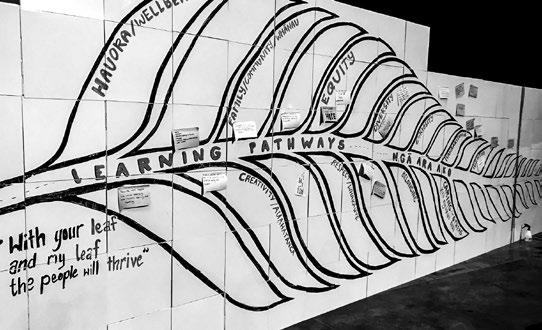
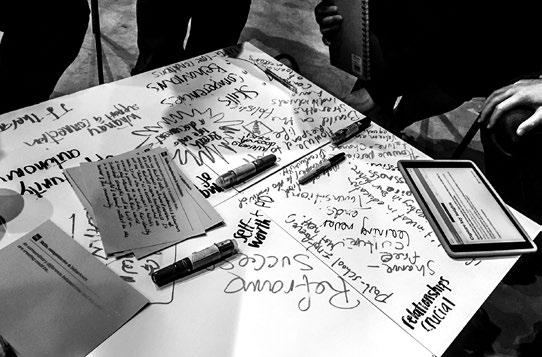
The other members are: • Marian Hobbs, a former school principal who became a Labour MP and Environment Minister under Helen Clark. • Professor Welby Ings of AUT University, who wrote a book, Disobedient Teaching, about finding innovative ways to motivate students that were often frowned upon by school principals. • Etta Bollinger, a Wellington poet, playwright and disability advocate. • Professor Rawinia Higgins, deputy vicechancellor Māori at Victoria University. • Dr Debbie Ryan, a Wellington consultant on Pasifika health issues. • Deborah Walker, chief executive of the NZ Centre for Gifted Education.
Speaking after the Auckland Summit, Zandra Vaccarino said that there was a real attempt to ensure that the Summit was accessible and that it was exciting to see youth and a more diverse representation of people attend this event. The event had no scheduled programme, but a master of ceremonies, Philippe Coullomb, guided the attendees through the two days. “I think that having collaboration facilitators plan and manage the event created a different platform for engagement which was really dynamic and allowed us to step out of what the current issues are and to work together to create a new vision.” The schedule for the two days was different from a usual conference and instead of the typical programme of events, what was offered was a range of “hubs" - each hub exploring a different topic. The six overarching topics were: 1. Ways of Learning 2. Ways of Teaching 3. Lifelong Learning 4. Skills and Abilities 5. Enabling Self-Fulfilling lives, and 6. Creating a Thriving Society.
Participants could decide which hub to attend and then answered broad questions in small groups of about eight. Following the discussion, the attendees could attend a range of presentations and then return to their original hub to explore the discussion questions further. Responses were recorded and opportunities were offered to add to the discussion by recording thoughts on whiteboards and discussion cards. Artists were also on hand to turn all the feedback into a visual representation known as “knowledge word” that summarised key themes and ideas that emerged in the discussions. “We also engaged in a process to identify the key values for an education system and my one concern was that equity was not included in the top 10 values identified in the Auckland summit,” said Zandra. To find out more about the summit you can go to https://conversation.education.govt.nz/




